BPP Calls for Reforms to Allow for Inclusivity in Agricultural Procurement

The Bureau of Public Procurement has called for reforms in the procurement system in the country especially for agriculture to ensure inclusivity of all major stakeholders and strata.
Speaking at the Workshop on
Inclusivity in Agriculture Procurement organised by the Centre for Social
Justice (CSJ) in Abuja on Monday, the Director-General of the Bureau of Public
Procurement, Dr. Adebowale Adedokun, said the workshop on “Inclusivity in Agriculture Procurement,” convened by the International Budget Partnership and the Small-Scale Women Farmers Organisation of Nigeria as part of the transformative “Engaging for Systems Change and Transformation” project is coming at an important time when the nation’s agricultural sector is yearning for development and needs to take its rightful position in the push for Nigeria’s economic growth.
Represented by the Head of the Research, Training & Strategic Planning Department.
Adesina Mokuolu, the DG said: “I extend gratitude for this opportunity to engage in meaningful dialogue on advancing inclusivity—an imperative for our nation’s agricultural and socioeconomic advancement.”
Adedokun while explaining that inclusion, in the context of agriculture procurement, means opening decision-making, funding,
and participation pathways to all stakeholders—especially women, youth, and marginalized groups, noted that: “It requires deliberate policies and practices that ensure that procurement systems do not exclude smallholders, women entrepreneurs, or rural communities from benefitting directly from government investments in agriculture.”
He noted that: “Agriculture remains the backbone of Nigeria’s economy, engaging millions, including women and small-scale farmers who are the primary stewards of our land and food systems. Yet, barriers persist—ranging from limited access to credit, market information, and fair competition—hindering full participation in procurement opportunities. Addressing these barriers is not just ethical, but essential to national development, food security, and poverty reduction.”
The DG while acknowledging persistent challenges in the procurement system with limited outreach and capacity-building targeting rural women and youth, inadequate support for smallholder farmer organisations to compete in procurement
processes, and gender bias and administrative complexity in accessing government contracts, said: “The Bureau of Public Procurement is proud to have advanced transparency, fairness, and competitive processes in public procurement, including agricultural sector interventions.”
He called on participants to “let us seize this moment to renew our commitment to inclusive procurement and investment in agriculture. I urge all participants—policy-makers, local champions, and international
partners—to advocate for practical reforms, invest in capacity-building, and champion the voices of smallholder women and youth in procurement processes.”
He insisted that: “Together, we can build agricultural systems that are not only productive and resilient, but equitable—ensuring no group is left behind in Nigeria’s journey toward food security and sustainable prosperity.”
In his welcome address, the Lead Director of the Centre for Social Justice, Barr Eze Onyekpere noted that the agricultural sector has the greatest employer of Nigerians need to be sanitized to allow for everyone to be carried along and to allow for poverty to be effectively tackled.
He noted that everyone should be impacted in the policies and actions taken by government and the gaps noticed in the procurement processes should be abridged in order for inclusivity.











